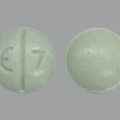
What is X Pills?
X Pills also known as Ecstasy or Extacy contains (MDMA, 3,4 methylenedioxymethamphetamine) a synthetic, psychoactive drug chemically similar to the stimulant methamphetamine and the hallucinogen mescaline. It is an illegal drug that acts as both a stimulant and psychedelic, producing an energizing effect, as well as distortions in time and perception and enhanced enjoyment from tactile experiences. Its primary effects are in the brain on neurons that use the chemical serotonin to communicate with other neurons. The serotonin system plays an important role in regulating mood, aggression, sexual activity, sleep, and sensitivity to pain.
Health Hazards of X Pills Use
For some people, this illicit drug can be addictive. A survey of young adult and adolescent users found that 43% met the accepted diagnostic criteria for dependence, as evidenced by continued use despite knowledge of physical or psychological harm, withdrawal effects, and tolerance (or diminished response), and 34% met the criteria for drug abuse. Almost 60% of people who use X Pills report withdrawal symptoms, including:
- fatigue
- loss of appetite
- depressed feelings
- trouble concentrating.
Research in animals indicates that this drug, also referred to as MDMA or Molly, is neurotoxic; whether or not this is also true in humans is under investigation. Its effect on cognition and memory is a concern. The drug can also be lethal on rare occasions.
Effects of X Pills Use
Chronic users of X Pills perform more poorly than nonusers on certain types of cognitive or memory tasks. Some of these effects may be due to the use of other drugs in combination with X Pills, among other factors. Research indicates heavy X Pills use may cause persistent memory problems in humans, although studies are conflicting.
Physical Effects:
- In high doses, X Pills can interfere with the body’s ability to regulate temperature. On rare but unpredictable occasions, this can lead to a sharp increase in body temperature (hyperthermia), resulting in liver, kidney, and cardiovascular system failure, and death.
- Because it can interfere with its own metabolism (breakdown within the body), potentially harmful levels can be reached by repeated drug use within short intervals.
- Users face many of the same risks as users of other stimulants such as cocaine and amphetamines. These include increases in heart rate and blood pressure, a special risk for people with circulatory problems or heart disease, and other symptoms such as muscle tension, involuntary teeth clenching, nausea, blurred vision, faintness, and chills or sweating.
Psychological Effects:
- Psychological effects can include confusion, depression, sleep problems, drug craving, and severe anxiety. These problems can occur during and for days or weeks after taking X Pills.
Neurotoxicity:
- Research in animals links X Pills exposure to long-term damage in neurons that are involved in mood, thinking, and judgment. A study in nonhuman primates showed that exposure to the compound for only 4 days caused damage to serotonin nerve terminals that was evident 6 to 7 years later.
- While similar neurotoxicity has not been definitively shown in humans, the wealth of animal research on damaging properties suggests that the chemical is not a safe drug for human consumption.
Hidden Risks and Contaminants:
- Other drugs chemically similar to X Pills, such as MDA (methylenedioxyamphetamine, the parent drug of X Pills) and PMA (paramethoxyamphetamine, associated with fatalities in the U.S. and Australia) are sometimes sold as X Pills. These drugs can be neurotoxic or create additional health risks to the user.
- X Pills tablets may be further contaminated with other substances in addition to MDMA, such as ephedrine (a stimulant); dextromethorphan (DXM, a cough suppressant that has PCP-like effects at high doses); ketamine (an anesthetic used mostly by veterinarians that also has PCP-like effects); caffeine; cocaine; and methamphetamine.
- While the use of this agent by itself or with one or more of these drugs may be inherently dangerous, users might also unknowingly combine them with substances such as marijuana and alcohol, putting themselves at further physical risk.
Medical Uses for X Pills (MDMA)
A small study published in The Lancet Psychiatry looked at the use of MDMA in patients suffering from post-traumatic stress disorder (PTSD). Researchers gave three different doses of MDMA to 22 veterans, three firefighters, and one police officer with PTSD. Among the participants, 23% had used X Pills before. MDMA use was also combined with psychotherapy sessions. A month after the second session, a greater percentage in the high-dose groups no longer met diagnostic criteria for PTSD, compared with the low-dose group.
After one year, 16 of the 26 participants (62%) no longer suffered from PTSD, but two had received a new diagnosis of PTSD. In addition, 12 patients were also taking additional psychiatric medications.
Side effects occurred with all doses and included: anxiety, headache, fatigue, muscle tension, difficulty sleeping (insomnia), and suicidal thoughts.
However, not all experts were convinced. Long-term safety could not be guaranteed with this small group, and there is a risk of addiction and suicide in a population already at risk for these serious outcomes. Researchers note larger phase 3 studies should be completed, but those with PSTD should NOT use MDMA on their own to try to replicate these results. SEE: How Long Does Ecstasy Stay In Your System
Addiction to X pill
Research and clinical viewpoints vary on how addictive X pill is, or whether it is addictive at all. There are many individuals who report becoming addicted to Ecstasy, but the clinical research on the subject is less extensive than with many other drugs. A number of studies have indicated that Ecstasy is addictive, though to a lesser extent than many other drugs. However, that does not mean that an Ecstasy addiction that has developed is not a serious problem.
Recognizing an addiction to ecstasy can be difficult because the drug lacks obvious withdrawal symptoms and is often used among young people in social settings. Regardless, continued use of ecstasy can lead to psychological and physical dependence. When someone is addicted to ecstasy, they will continue to use the drug despite knowing the consequences. Even when ecstasy is not the only drug causing dependence, it can be a piece of a multi-drug patchwork of addiction.
The most telling sign of ecstasy addiction is wanting to stop but being unable to.
Other criteria include developing a tolerance to ecstasy, spending an extraordinary amount of time trying to get it, and using more of it than intended. For more information, please visit The National Institute on Drug Abuse





